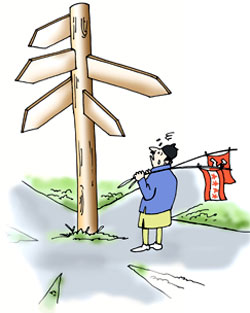 There is a lot riding on last week's peace pact between the seven parties and the Maoists.
There is a lot riding on last week's peace pact between the seven parties and the Maoists.
If it paves the way to a new Nepal we will see prosperity and development. If it fails, it will be a return to a vicious war which this time will be a fight to the finish.
Kathmandu's social circuit is abuzz with talk of "Munich", "appeasement" and snide references to "peace in our time". There is a perception that the government gave too much away and didn't get enough in return.
To be sure, it does appear as if it is the government that is doling out all the concessions: release of Maoist prisoners, lifting the terrorist tag, dissolution of the house, agreement on an interim constitution. And the alliance hasn't even managed to get a public commitment from the Maoists to renounce violence or agree on a timetable for demobilisation.
But seen from their side, after April the Maoists were beginning to feel redundant. Parliament, through a series of proclamations, had passed most of the demands that the rebels had foght for ten years to achieve. The comrades felt they were deliberately left out of a seat at the banquet table.
In a sense, the Maoists can be seen to have made the biggest climbdown of all: a stated commitment to re-enter mainstream competitive politics. In doing so, the leadership has taken a big risk: not of being marginalised by the parties or decimated by the military, but of sparking a revolt within their revolution.
It's a tight rope walk for Pushpa Kamal Dahal as he tries to sell his plan out west this week: to balance his stated desire to join the mainstream and get his hothead commanders to agree. So when he talks tough, the target audience is his own rank and file.
Even so, the Maoists haven't given the parties and the public much reason to trust them. Wildly contradictory statements ("we're preparing for an October Revolution"), inflammatory and irresponsible threats ("if we come to power we will ban the NC") and a refusal to atone for past atrocities don't help engender confidence that the rebel leadership is serious about reaching a negotiated settlement.
The bottom line here is that the Maoists can't be part of an interim government without a public commitment to renounce violence. An eight-party government can't have two armies.
In exchange for peace, the people seem willing to test the Maoists' commitment to guarantee their fundamental rights to life, liberty, property, and free expression. Otherwise why should the people trust them?


